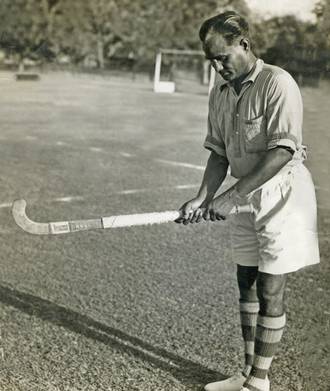
Article courtesy Sportstar, Photo courtesy
The Hindu
 ndia
made its Olympic hockey debut at the 1928 Amsterdam Games and reigned
supreme for close to three decades, winning eight gold, one silver and
two bronze medals. The achievements in hockey stand among the greatest
in Indian sports history. Here are the top five Indian hockey's greatest
moments.
ndia
made its Olympic hockey debut at the 1928 Amsterdam Games and reigned
supreme for close to three decades, winning eight gold, one silver and
two bronze medals. The achievements in hockey stand among the greatest
in Indian sports history. Here are the top five Indian hockey's greatest
moments.
1. 1928 Amsterdam Olympics Gold - Birth of the legend of
Dhyan Chand
India was the first non-European country to gain an entry to the 1928
Amsterdam Games when hockey made a return to the Olympics. It served as
a global announcement of India's might as a hockey powerhouse and Dhyan
Chand as the country's first sporting icon.
India scored 31 goals and conceded none on its way to its first
Olympic gold. India defeated host Netherlands 3-0 in the final, with
Dhyan Chand scoring a brilliant hat-trick
2. 1948 London Olympics Gold - Emergence of Balbir Singh Sr.
The Indian team, led by mercurial winger Kishan Lal, set foot on
English soil carrying the hopes of an independent nation and the scars
of the partition. Star forward Balbir Singh Sr. had witnessed the
horrors of partition while serving in Punjab Police.
The Indians did not put a foot wrong on the pitch as they outclassed
Austria, Argentina and Spain to reach the semifinals. The Netherlands
put up a good fight but India prevailed 2-1 to set up a final against
England.
The Indians faced their colonisers of 200 years for the first time on
August 12, 1948 at the Empire Stadium at Wembley. Skipper Kishan Lal and
his deputy K. D. Singh 'Babu' decided to take off their shoes and play
barefoot, as they supplied a pass each for Balbir's first-half brace.
Trilochan Singh and Patrick Jansen added two more in the second half as
India coasted to a 4-0 victory.
3. 2002 Commonwealth Games Women's Gold - The giant-killing
machine
Indian women's hockey team was the dark horse going into the Manchester
Games in 2002.
In the crossover match to reach the semi-finals, the team was down
0-3 against the rampaging South Africans, but roared back with four
goals in the second half to reach the semis, where New Zealand awaited.
The Indian eves edged out higher-ranked New Zealand 2-1 to reach
their first Commonwealth Games final. On 3rd August, 2002, M. K.
Kaushik's team took to the pitch against a strong England team. Regular
time ended 2-2. India had the better of exchanges in extra-time, and in
the 78th minute, Mamata Kharab and Sita Gossain combined during a
penalty corner to score the golden goal and seal victory.
The women's team's crowning achievement would serve as an inspiration
for the beloved 2007 sports flick Chak de! India.
4. 1975 Kaula Lumpur World Cup win - Ashok Kumar's redemption
Team manager Balbir Singh Sr, a triple-Olympic champion, built the
team around the motto - 'Regaining world supremacy is our goal' - which
was painted on the wall of team dormitory at the training camp.
India began the tournament with a win, a draw and a loss: 2-1 win
against England, 1-1 against Australia and lost 2-1 to Argentina.
However, big victories against Ghana and West Germany helped it top Pool
B and qualify for the semifinal.
India trailed host Malaysia twice in the semifinal before Harcharan
Singh's goal in extra-time put Ajit Pal Singh's men set up a final
against arch-rival Pakistan.
India trailed Pakistan 0-1 before Surjit Singh pulled the Indians
level ten minutes into the second half. Fittingly enough, Ashok Kumar,
son of legendary Dhyan Chand, scored the winner in the 51st minute,
making up for his miss in the 1973 final.
Millions of Indians, tuned into their radio sets, celebrated wildly
to Jasdev Singh's legendary booming voice on All India Radio. It remains
India's only World Cup win till date.
5. 2019 Olympics Qualifiers - Rani Rampal's Golden Goal
Indian women's hockey team was the underdog going into the two-legged
Olympic Qualifier at home against USA. Its head-to-head record was 4
wins to America's 22.
The first leg ended 5-1 in India's favour. Staring down the barrel,
USA staged a blistering fightback in the second leg by making it 4-0
before half-time, and tieing 5-5 on aggregate.
During half time, India head coach Sjoerd Marijne told his players to
forget everything that had happened until then, and prepare for a new
match starting at 0-0.
The clean-slate worked wonders for the Indian women who regained
their stride. With 11 minutes to go, Rani Rampal tilted the scales in
India's favour when she pounced on a rebound on the edge of the circle.
She paused for a moment, picked her spot and flicked the ball over the
onrushing defenders and the goalkeeper's outstretched arms into the top
right corner of the net. The Kalinga Stadium in Bhubaneswar erupted.
Rani's goal sealed a 6-5 win on aggregate - Indian women's team's
third Olympic appearance, and its first-ever back-to-back Olympic qualification.
![]()